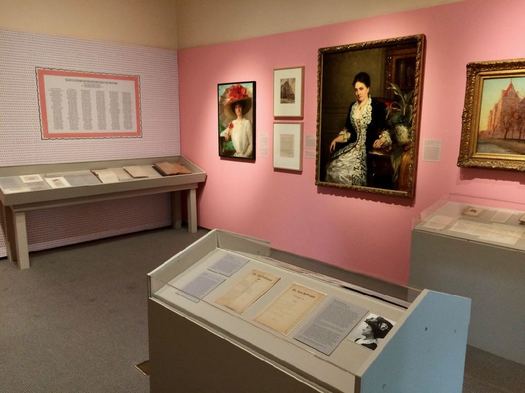Albany and Anti-Suffrage at Albany Institute

Pink was one of the trademark colors of the anti-suffrage movement.
New York State was a hotbed of the women's suffrage movement. Seneca Falls. Susan B. Anthony. Elizabeth Cady Stanton. It's a story you know.
But New York -- and Albany, specifically -- was also a focal point of the anti-suffrage movement.
A new exhibit at the Albany Institute of History and Art shines a light on this aspect of the story surrounding the push for women's suffrage. Blurbage:
Today it is impossible to imagine a world where women didn't have the right to vote. The years leading up to 1917 were fraught with difficulty both politically and personally for women on both sides of the argument. Not every woman wanted the right to vote. In fact, Albany was considered a stronghold of the anti-suffrage movement. This exhibit tells the story of the women who first met in 1894 before the New York Constitutional Convention convened, organized the Albany branch of the New York State Association Opposed to Woman Suffrage, lobbied to make their views heard in 1915, and lost their fight in 1917.
As the exhibit notes, 8,000 women in the Albany area signed document in 1894 opposing a change to the state constitution that would have opened the way for women to vote. And a listing details the officers of a local anti-suffrage women's group in 1905 -- it's full of prominent names you'll recognize from local history.
The exhibit explores some of the reasons for the opposition to women's suffrage, including a belief that women having the right to vote would compromise their traditional roles in the home and community. From a 1914 interview with Albany native Mary Magrane Glynn -- who was also the wife of governor Martin Glynn:
I don't think women should ever vote ... The vote will never do them any good that I can see. One result of it would be to lower them in men's estimation. Homes today are already too complicated, without bringing in politics. Why, you would have women competing with me! Thank what the effect of that would be.
Women are not mentally equipped to cooperate or compete with men. I have seen very few women that could survive such a test. Mind, I do not try to influence my husband along this line. He is inclined toward suffrage. That is his belief. I am opposed to it; that is mine. If the question of a suffrage bill comes up in our State I shall not try to defeat it. That would be politics, and I don't believe in mixing in politics.
There's also a look at how the issue prompted a schism between two longtime friends -- one of them Emily Rankin, a descendant of the Van Rensselaers who lived at the Cherry Hill mansion -- who had roomed together at Smith College. As her friend, Dorry Scribner, wrote to her in shock about her support of anti-suffrage: "Oh Emily how could you?"
There are a handful of talks to go along with Albany and Anti-Suffrage, including one on September 17 with SUNY Oneonta historian Susan Goodier about about the use of political cartoons by pro and anti suffrage sides.
Votes for Women: Celebrating New York's Suffrage Centennial
Of course, suffragists ultimately did win out. And an exhibit commemorating the centennial of women's suffrage in New York State opens at the State Museum November 4.
Hi there. Comments have been closed for this item. Still have something to say? Contact us.
Comments
And the first thing they did with their vote was take away our beer.
... said Herbert on Sep 8, 2017 at 8:49 AM | link
The first president they elected was Warren G Harding
... said Eric Scheirer Stott on Sep 8, 2017 at 12:57 PM | link
@ Herbert
The 18th Amendment (prohibition) was ratified in 1919, and went into effect January 1920.
The 19th Amendment, which prohibits the states and the federal government from denying the right to vote to citizens of the United States on the basis of sex, went into effect August 18, 1920.
So, no, women did not vote to take away your beer.
... said capgirl on Sep 11, 2017 at 9:54 AM | link
@capgirl -- You seem to think women didn't have the right to vote prior to 1919/1920. That is not the case. Many states gave women full or partial voting rights as early as Wyoming in 1890. It was a long, state-by-state process prior to the passage of the 19th amendment. (NYS granted women the right to vote in 1917.) And like it or not now, women's suffrage and temperance went hand in glove historically. Temperance was one of the premier "women's issues" of the late 19th and early 20th centuries and a reason women wanted the vote -- temperance was considered by many to be part of the "progressive agenda." Back then, rampant alcoholism (or the perception of it) was viewed as a social problem like today's opioid epidemic. Without women pushing for temperance and prohibition, the Volstead Act would not have become law.
So, yes, women did take away the men's beer. Not all on their own, but they were key players.
... said chrisck on Sep 11, 2017 at 2:38 PM | link